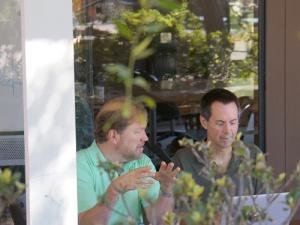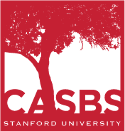Submitted by medium on Fri, 07/14/2017 - 09:01
The Center for Advanced Study in the Behavioral Sciences (CASBS) at Stanford played a preeminent role in the early decades of the study of organizations. Some of the foundational work in the field was conducted at the Center — by economists, political scientists, social psychologists, and sociologists.
But an important goal at CASBS is not only to shape but also to integrate contributions from different disciplines approaching individual questions, and the Center has a long history of convening summer institutes to pursue such integration. It hosted a series of institutes on a variety of topics and themes between 1977 and 2007, and seeks ideas for new summer institutes from the scholarly community.
In 2016, CASBS returned to the tradition with a Summer Institute for social and behavioral scientists on “Organizations and Their Effectiveness,” supported by funding from MIT, Stanford’s Dean of Research, the Stanford Institute for Economic Policy Research, Stanford’s Graduate School of Business, and the Hoover Institution. Based on 2016’s tremendous success, CASBS will host a second summer institute, again on organizations and their effectiveness, from July 10 to July 21, 2017.
Last year’s sponsors return, with added support from philanthropist and business leader Paul Ricci (Stanford B.A., M.A.) and his wife Nicole Ricci. The institute again will be co-directed by Stanford’s Woody Powell and MIT’s Robert Gibbons, both former CASBS fellows and leaders of past CASBS summer institutes. They are planning institutes for the following three summers as well.
A competitive application process resulted in awards of thirteen fellowships covering tuition, room and board, and travel. Patricia Bromley, assistant professor at Stanford’s Graduate School of Education, is among the summer institute fellows. Senior scholars participating include Jenna Bednar (University of Michigan), Dan Carpenter (Harvard), Kate Kellogg (MIT), and Scott Page (Michigan). View a list of all 2017 participants, their disciplines, and home institutions here.

Boot Camp for Scholars
The intensive two-week “boot camp” is comprised of young scholars (ranging from late-stage graduate students to advanced assistant professors) whose careers studying organizations are underway, and who have demonstrated an interest in and an aptitude for expanding their thinking about organizations towards other disciplines. An important aspect of the institute is that it is highly interdisciplinary; it brings together a cohort of promising young researchers from a wide range of fields, including communication, economics, education, management, political science, social psychology, and sociology.
The institute blends 20th-century classics — by foundational thinkers (and former CASBS fellows) such as Kenneth Arrow, Ronald Coase, Robert Dahl, Charles Lindblom, James March, Robert Merton, Roy Radner, Philip Selznick, Herbert Simon, Oliver Williamson, Harold Wilensky, and many others — with 21st-century frontier work from organizational economics, organizational culture, economic sociology, networks, organizational ethnography, and administrative organization. Lectures, seminars, and presentations mix with pizza-fueled problem-solving collaborative exercises, as well as walks to The Dish and lively ping pong sessions.
The institute also includes group dinners with special guests who share insights and perspectives from a variety of disciplines and organizational landscapes. On tap for 2017 are a host of Stanford- and CASBS-affiliated luminaries: Paul Brest (dean emeritus, Stanford Law School and CASBS board member), Shona Brown (Google Emeritus, CASBS board member, and Stanford PhD), Joshua Cohen (Marta Sutton Weeks Professor of Ethics in Society; professor emeritus of political science, philosophy, and law), Mariano-Florentino Cuéllar (California Supreme Court Justice, visiting professor of law at Stanford, former director of the Freeman Spogli Institute, and Chair of the CASBS board of directors), Fred Turner (Harry and Norman Chandler Professor of Communication and two-time CASBS fellow), and Mark Wolfson (former chaired professor, Stanford Graduate School of Business).
A Larger Purpose
One aim of the institute is to bring participants out of fragmented disciplinary silos and comfort zones and instead promote a depth and breadth of thinking. With this in mind, the institute provides the exposure, time, and space for enabling discovery. Based on exit interviews from the 2016 summer institute, it’s working beyond expectations.
“My view of interdisciplinary work in the social sciences…changed a lot as a result of this institute,” said Mike Powell, an economist from Northwestern University. “In the past, interdisciplinarity seemed often sold as an object in itself…rather than as a means to achieve an understanding of complex social phenomena by going beyond my own discipline’s boundaries.”
Powell’s colleague Ameet Morjaria received a similar take-home message.
“The workshop was an eye-opener,” he said. “Prior to it I had limited exposure and knowledge of how other social sciences pursued scholarly work on organizations. … I hope to internalize a more open-minded pursuit of questions and identify opportunities where I can leverage some of the insights from other fields.”
The institute compelled Melissa Valentine, assistant professor of management science and engineering at Stanford’s School of Engineering, to “crave the…creativity that can come from thinking hard across disciplines.” Equally important, it inspired her to encourage her own students “to think about the big important questions, to look higher up the tree of knowledge for where they are making their contribution, and to take organizations as a social phenomenon seriously for changing the world.”
The cultivation of such an expansive mindset gets to the core of the institute’s larger purpose: to revitalize the field of organizations over a period of years. It seeks to harness the “gains from trade” from studying various types of organizations — firms, legislatures, hospitals, courts, churches, schools, and social movements — and spread learning from instances of “bright spots” and successful performance within and among them.
Only at CASBS
The revitalization process starts at CASBS, with a small cohort of scholars that will grow not only through successive summer institutes, but through an infusion and diffusion of fresh conceptual and applied thinking in which the participants carry ideas, findings, and knowledge back to their respective institutions and personal academic networks — and, ideally, to society at large.
It’s difficult to overstate the instrumental role of CASBS in this multi-year effort. The 2016 summer institute helped University of Minnesota sociologist and public health researcher Russ Funk, for example, “see how tremendously valuable places like CASBS are for giving scholars shelter from day-to-day demands…and offering time to think about and develop higher impact work.”
“As a result of the summer institute I am starting to understand the field of organizations much more and to situate my work within it — to see where my research fits and what I can learn from other works to strengthen it,” said Consuelo Amat Matus, a political science PhD candidate at Yale University. “My scholarly career now has a strong link to a community of organizational scholars that I did not have before.”
“It’s enormously fitting that we undertake this enterprise at CASBS,” says co-director Gibbons. “It gives us two storied traditions: a substantive tradition in the study of organizations, and a methodological tradition in the integration of disparate (often silo-ized) disciplines. We hope to do both traditions justice by guiding a generation of emerging scholars as they prepare to tackle vital organizational questions and significant social problems.”
As many know, CASBS has a way of exerting a certain gravitational pull on talented people. One 2016 summer institute participant, Aaron Shaw, an assistant professor of communications studies at Northwestern University, will return to the Center in September as a 2017–18 CASBS fellow.
“I plan to continue many of the conversations that started during the institute — at the individual/personal level, at the conceptual level through my research, and at the institutional level by seeking out opportunities to extend and replicate aspects of the experience at my home university and other settings,” says Shaw.
Inspired Leadership
CASBS cannot play its instrumental role in this renaissance in the study of organizations without the right leaders intersecting at the right time. Indispensable to the summer institute revitalization are its co-directors, Woody Powell and Robert Gibbons — themselves eminent scholars of organizational studies, and both with deep ties to and affection for CASBS and Stanford.
On the Stanford faculty since 1999, Powell is a professor at the Graduate School of Education, with courtesy appointments at the departments of sociology, communication, organizational behavior, and management science and engineering. He also co-directs the Stanford Center on Philanthropy and Civil Society. A two-time CASBS fellow (1986–87, 2008–09), Powell works in the areas of organization theory, economic sociology, and the sociology of science, focusing on the processes through which knowledge is transferred across organizations. He’s particularly interested in the role of networks in facilitating or hindering innovation and the role of institutions in codifying ideas. His collaborations with former CASBS fellow (1984–85) Paul DiMaggio are considered seminal within organizational theory. Their now-classic book, The New Institutionalism in Organizational Analysis (1991), was hatched at a conference during Powell’s first CASBS year. Powell wrote his influential article, “Neither Market nor Hierarchy,” during the same year. Both works have been cited more than ten-thousand times.
“Bob [Gibbons] and I, in collaboration with CASBS director Margaret Levi, want to raise the intellectual aspirations of what we hope will develop into a new cadre of cross-disciplinary, problem-solving scholars who attain fluency in a wider set of theories and methods — from field experiments to archival research to ethnography to simulations — in an array of organizational settings,” said Powell. “Truth be told, as co-directors we learn greatly from the participants, too. The experience influences my own teaching and research considerably.”
Gibbons, based at MIT’s Sloan School of Management and economics department, is a leader in the field of organizational economics, specializing in theoretical and empirical models concerning organizational design and performance. And Stanford basically is his second home. He grew up in Palo Alto and earned his PhD at Stanford’s Graduate School of Business, training under the likes of David Kreps, Bob Wilson, and Jim March. He’s also a two-time CASBS fellow and has served on the CASBS board and other Center committees in several capacities throughout the years.
“From grad school at Stanford in 1981–85, to my first CASBS fellowship in 1994–95, to my second in 2014–15, I’ve learned to appreciate and utilize the enormous resources at CASBS and Stanford to help me think about organizations in richer ways,” says Gibbons.
For both Powell and Gibbons, reviving the CASBS summer institute is a way of giving back to an institution that has figured so powerfully in their intellectual lives and collaborations.
But the experience and expertise the two bring to the undertaking, according to CASBS program director Sarah Wert, vastly understate the role they are playing together in re-engaging and reinvigorating the “storied traditions” Gibbons mentioned earlier — and then advancing them forward.
“Bob and Woody are the perfect pair to lead a CASBS summer institute,” says Wert. “Their histories give them a passion for the Center. To watch them take participants through several decades of scholarship on organizations with such care, then reveal that many of the intellectual heroes responsible for them did their work here at the Center, is an unforgettable treat. No doubt, participants leave inspired and ready to become part of a new cohort that understands interdisciplinarity is the way of the future, and aware that they themselves join the company of scholars who have enjoyed career-changing experiences at CASBS.”
Read More Link:
